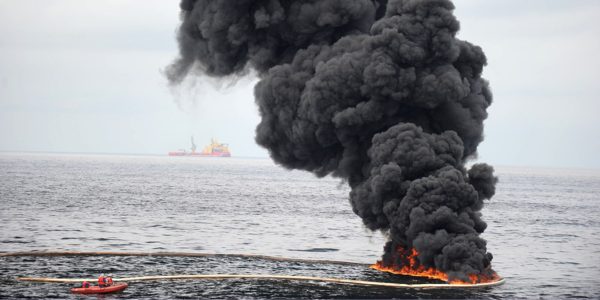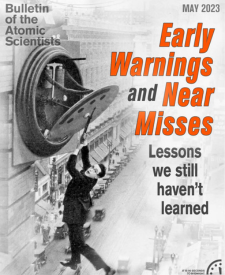
Bulletin of the Atomic Scientists, May 11th 2023
Posted: 11th May 2023
May 11, 2023

Smoke billows from a controlled oil fire in the Gulf of Mexico after the 2010 Deepwater Horizon Oil Spill.
SPECIAL TOPICS
Lessons learned in blood: Why we fail to use near-misses to prevent man-made disastersMost man-made disasters are preceded by near-misses, where something goes awry but luck prevents things from going truly and irreparably wrong. People can learn from these experiences and make changes to prevent future disasters—but often don’t, writes professor Catherine H. Tinsley. This premium article available to everyone for a limited time.
SPECIAL TOPICS
The politics of the Eurovision Song ContestIn a new video Bulletin associate multimedia editor Erik English interviews Eurovision expert Dr. Dean Vuletic on the political history of the much loved competition. Watch here.
NUCLEAR RISK
Nuclear Notebook: Russian nuclear weapons, 2023This year, Russia is continuing modernization of its nuclear forces intended to replace most Soviet-era weapons by the late-2020s. Nuclear information experts Matt Korda and Hans M. Kristensen provide the latest estimates on the numbers and types of nuclear weapons the country has. Read more.

Subscribe to access this issue and every issue published since 1945
For less than $5 a month, premium subscribers gain access to the Bulletin’s digital magazine, which publishes six times a year. You’ll also be able to view our archive, which contains every article published since 1945.
IN THE NEWS
Lab safety can be improved without torpedoing scientific progressThis New York Times article highlights a keynote address at a conference sponsored by the Bulletin in Geneva where Harvard epidemiologist Marc Lipsitch “sketched out a levelheaded, unobtrusive approach capable of delivering a much safer research landscape.” Read more.
CLIMATE CHANGE
How the mirage of oil shale riches in Utah threatens the Colorado RiverPulling a single barrel of oil out of shale requires two to four barrels of water, which is exactly what the arid Uinta Basin doesn’t have, writes Mother Jones staff reporter Stephanie Mencimer. Read more.
QUOTE OF THE DAY
“To assert leadership, the U.S. should actively resist the normalization of nuclear threats by countering those at home and abroad who suggest the use and consequence of tactical nuclear weapons can somehow remain limited. Additionally, planned spending on nuclear modernization is unnecessary and wasteful and some of that money should be reallocated. Most bravely, the U.S. should announce a commitment to work closely with friends and allies to develop a shared vision in which a future no-first-use policy is understood to strengthen, not weaken, a U.S. commitment to its Asia-Pacific allies and beyond.”
— Rachel Bronson, Bulletin president and CEO, “Ask the Experts: How Should the U.S. Address Nuclear Dangers?,” Carnegie Corporation of New York
Your ongoing support ensures we stay on mission and get the job done.
Thank you!

